Get Productive With AI – January 8th at Noon EST
Get conversion-focused artificial intelligence training from Flint McGlaughlin. Go to MeclabsAI.com/GetProductive to register for this no cost event and see the 7 principles Flint will teach.
MeclabsAI is the parent company of MarketingExperiments
Email is more important than ever before. Consider these statistics:
- 70% of consumers prefer to be contacted via email, even those age 65+ (MarketingSherpa)
- 66% have made purchases as a direct result of email (Direct Marketing Association)
- Email is nearly 40 times more effective at acquiring new customers than Facebook or Twitter (McKinsey & Company)
However, even if you have the finest email distribution technology reaching the most thoughtfully developed and segmented email list, if the recipient deletes the email instantly, it’s all for naught. In contrast, if recipients consistently open your emails, read them and take action, you’ll see results.
That’s why knowing how to write a strong email subject line is critical.
Fortunately, you don’t have to be an expert copywriter to do it. You just need to know the elements that have been proven to drive more opens and clickthroughs.
To find out what they are, be sure to watch the most recent MarketingExperiments Web clinic. It examines multiple subject line experiments and several live tests, while outlining what worked, what didn’t and why. Within 30 minutes, you’ll have the knowledge you need to start writing winning subject lines.
We’ll examine two experiments from the clinic here:
Background: A regional marketing commission that has been anonymized.
Goal: To raise awareness of local activities and events to increase the number of travelers and tourists.
Research Question: Which subject line will generate the most opens and clickthrough?
Test Design: A/B split test (protected)
Note: Boston was the substitute city used for this presentation.
Experiment #1
The Control asked recipients if they’re a fall foodie and then invited them to see what’s going on in the region.
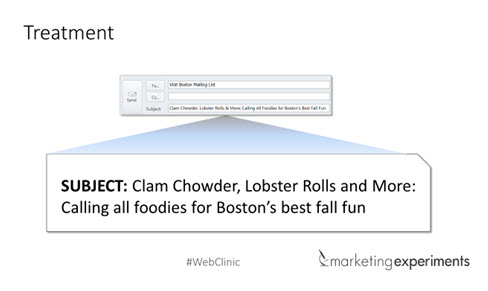
The Treatment used words that are tangible; you can almost taste the flavors of the city. This tempted recipients by immediately inviting them to partake in a uniquely Bostonian dining experience.
Results
The Treatment’s subject line drove 10% more recipients to open their emails. From that, there was a 15% lift in those who clicked through from that email to learn more about what’s going on in Boston.
Experiment #2
This Control provided a specific offer: what they’re saving (30% off), where they’re going to be saving it (a hotel) and when they’ll be saving (December).
The Treatment mentions nothing of hotel savings and, instead, focuses on the experiences the recipient will enjoy by visiting Boston.
Results
The Treatment outperformed the Control in both opens and clickthrough. The subject line convinced 9% more recipients to open their emails. From there, 26% more clicked through from the email to learn about what’s going on in Boston.
What these tests teach us about subject lines
• Use words that are specific and tangible
Both winning headlines created an image in the recipient’s mind about what he or she would experience in Boston: dining on lobster rolls, attending the orchestra and holiday shopping. While 30% off a hotel room may seem specific, it’s sales-oriented and vague.
A strong subject line will clearly communicate value that the recipient genuinely cares about. That will be expanded on in the email to produce the continuity, which will ultimately result in higher clickthrough.
• Lead with what the recipient will get, rather than what the recipient must do.
In the first Control, the recipient had to answer a question. In the second, he had to “book now.” In contrast, the first Treatment focuses on the delicious dishes the recipient will have a chance of experiencing by visiting Boston; the second focuses entirely on the experiences he’ll receive. Don’t focus on what you want the customer to do for you. Instead, put yourself in the mind of the customer and ask, “What is the very best that I’m going to receive by opening the email?” Lead your subject line that way.
• The “ask” in both winning subject lines is implicit rather than explicit.
The first Control leads by asking the recipient a question: “Are you a fall foodie?” The second asks to “Book now.” Nothing is asked of the recipients in the Treatment subject lines. Instead, the subject lines’ imply what the recipient will have to do to experience the value the subject lines communicate. But first, the recipients will have to open the email.
You might also like
Marketing Research Chart: How do customers want to communicate? [MarketingSherpa Chart of the Week]
Marketing Research Chart: Does email produce an ROI? [MarketingSherpa Chart of the Week]
Email Marketing: How a B2B company lifted conversion 200% with personalized email messages [MarketingSherpa case study]
MECLABS Email Messaging Online Course [MECLABS online certification course]





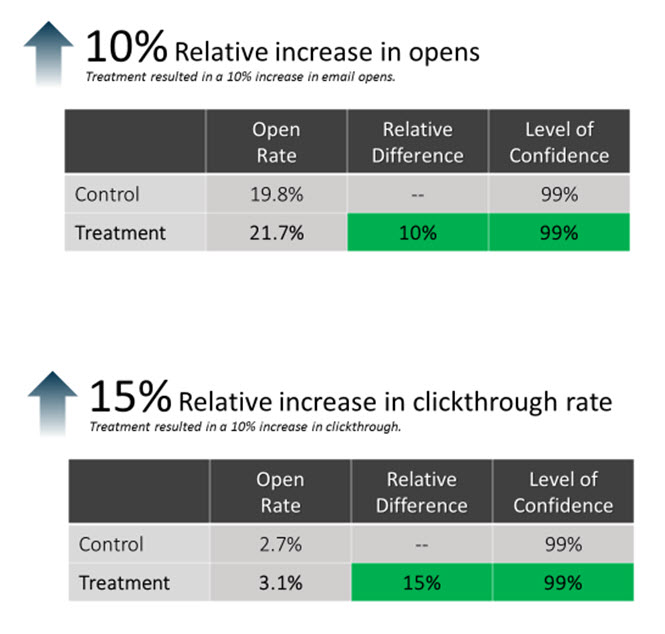
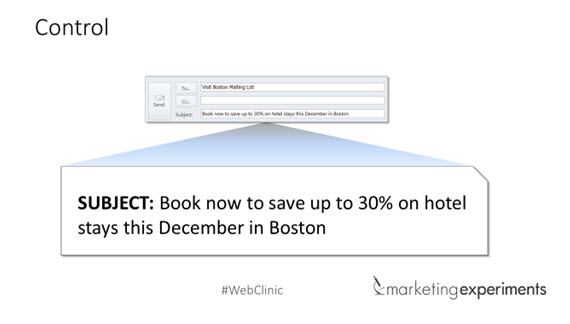
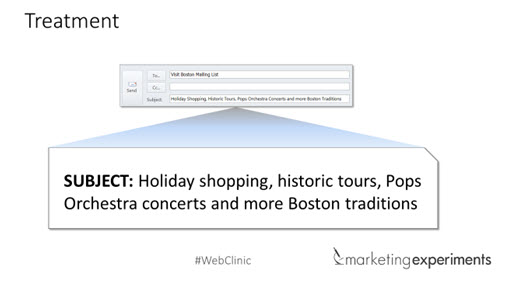
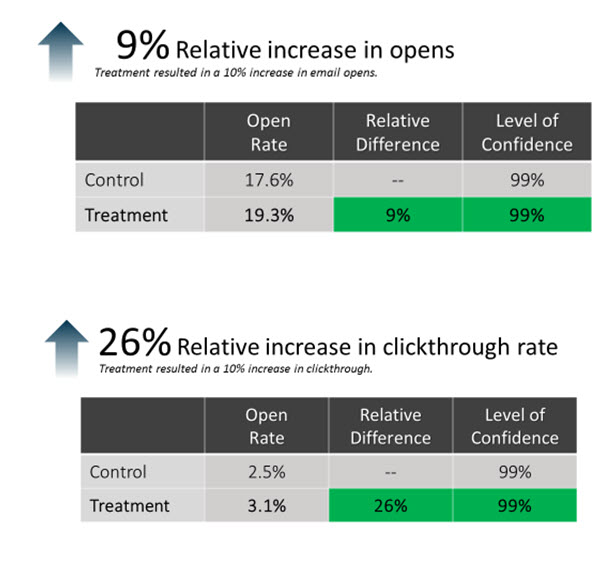
One thing you have to keep in mind when writing subject lines is your goal and user intent. The goal was to increase awareness to bring in more people, so having a subject line that’s sales oriented and designed to get user to buy is not aligned with the campaign goal.
You’re trying to plant the seed (the thought or idea) of visiting Boston in their minds. Those that did click through to the website, might be more ripe for a sales email as a follow up. Since they did show some interest, and a discount on a hotel might be just what they need to come visit Boston.
The last bit to know is what type of an audience you’re working with, so you can cater your messaging to their specific needs.
Thanks so much for your thoughtful comment, Viktor. I absolutely agree with you that you need to know your audience. These recipients had already signed up to learn more about the region. I should have made that clear in the article. Again, I appreciate your feedback.
Also worth noting that the purchase decision cycle for hospitality and leisure travel is very different from purchasing a commodity product like books or tires. People research new destinations, then select accommodations, adding attractions or features to their plan. So subject lines with experiences as benefits work better. Vacations are expensive and important so people do research.
Business travelers, however, have a set plan and destination. Their purchase of an accommodation is more like purchasing a commodity. Just book the best deal and go.